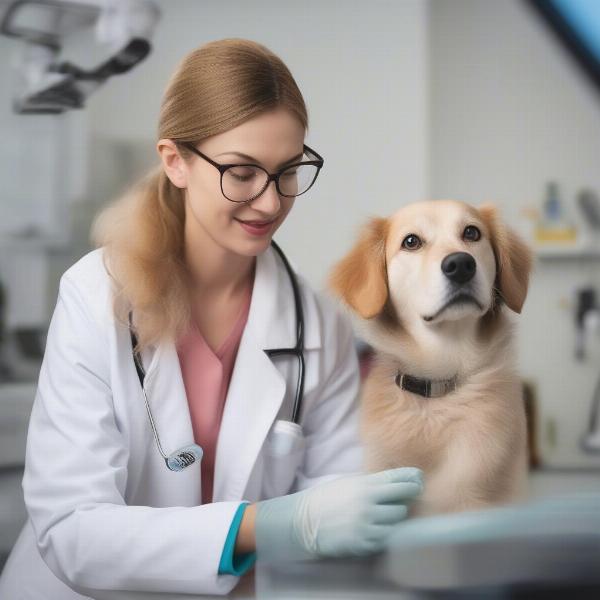Lyssin is a homeopathic remedy sometimes used in canine care, primarily for treating symptoms related to rabies or nervous system disorders. While not a replacement for conventional veterinary care, understanding lyssin can offer pet owners additional insights into holistic treatment options. This article will delve into lyssin for dogs, exploring its potential uses, benefits, and considerations for pet owners.
Understanding Lyssin’s Role in Canine Health
Lyssin isn’t a preventative measure against rabies, nor is it a cure. Its primary function is to address specific symptoms that might manifest in dogs with nervous system issues or those recovering from rabies vaccinations. These symptoms can include restlessness, anxiety, aggression, hypersalivation, and difficulty swallowing.
How Lyssin Works
Lyssin is derived from the saliva of a rabid dog, and through the process of homeopathic potentization, it is diluted to the point where the original substance is virtually nonexistent. The core principle of homeopathy is that “like cures like,” meaning a substance that causes certain symptoms in a healthy animal can, in a highly diluted form, treat those same symptoms in a sick animal. This mechanism is still debated within the scientific community. Always consult with a holistic veterinarian before administering any homeopathic treatment, including lyssin.
When to Consider Lyssin for Your Dog
While lyssin is primarily associated with rabies-related symptoms, holistic veterinarians might recommend it for other behavioral or neurological issues, such as:
- Anxiety and Fear: Dogs exhibiting heightened anxiety, fear, or phobias might benefit from lyssin.
- Aggression: In cases of unexplained aggression, particularly if accompanied by hypersalivation or sensitivity to touch, lyssin could be considered.
- Post-Rabies Vaccination Symptoms: Some dogs experience mild side effects after rabies vaccinations. Lyssin might help alleviate these symptoms.
Administering Lyssin to Your Dog
Lyssin is typically available in pellet or liquid form. The dosage and frequency will depend on your dog’s individual needs and the specific condition being addressed. It is crucial to work with a qualified holistic veterinarian to determine the appropriate dosage and treatment plan. Never self-medicate your dog with lyssin or any other homeopathic remedy.
What to Expect After Administering Lyssin
The effects of lyssin can vary depending on the individual dog. Some pet owners report seeing improvements in their dog’s behavior within a few days, while others might not notice any significant changes. It’s essential to monitor your dog closely and communicate any observations to your veterinarian.
Lyssin: Not a Substitute for Veterinary Care
It is crucial to understand that lyssin is not a substitute for conventional veterinary treatment, particularly for serious conditions like rabies. If your dog exhibits any signs of rabies or other neurological disorders, seek immediate veterinary attention. Lyssin should only be considered as a complementary therapy under the guidance of a holistic veterinarian.  Veterinarian conducting a thorough dog examination
Veterinarian conducting a thorough dog examination
Conclusion
Lyssin, a homeopathic remedy, offers a potential complementary approach to managing certain neurological and behavioral symptoms in dogs. While its effectiveness remains a subject of debate, some pet owners find it beneficial for addressing anxiety, aggression, and post-rabies vaccination symptoms. However, it’s paramount to consult with a qualified holistic veterinarian before administering lyssin to your dog. Never use lyssin as a replacement for conventional veterinary care, especially in cases of serious illness.
FAQ
- Is lyssin safe for dogs? When administered correctly under the guidance of a holistic vet, lyssin is generally considered safe.
- Can lyssin cure rabies? No, lyssin is not a cure for rabies. Immediate veterinary attention is crucial if you suspect your dog has rabies.
- How long does it take for lyssin to work? The effects of lyssin can vary. Some pet owners see improvements within days, while others might not notice significant changes.
- Where can I buy lyssin for my dog? Lyssin is available from some homeopathic pharmacies and online retailers.
- What’s the difference between lyssin and a rabies vaccine? A rabies vaccine provides crucial protection against the rabies virus, while lyssin is a homeopathic remedy that might address certain symptoms.
- Can I give my dog lyssin and conventional medication at the same time? Consult your veterinarian before combining lyssin with other medications.
- What are the potential side effects of lyssin? Lyssin typically has minimal side effects, but it’s crucial to consult a veterinarian before administering it.
ILM Dog is your trusted resource for comprehensive dog care information, offering expert advice on breeds, health, training, nutrition, grooming, and more. We connect you with a global community of dog lovers and provide the knowledge you need to nurture your canine companion. For any questions or concerns, feel free to reach out to our expert team. Email: [email protected], Phone: +44 20-3965-8624. Visit ILM Dog for more valuable insights and resources to support your dog’s well-being.